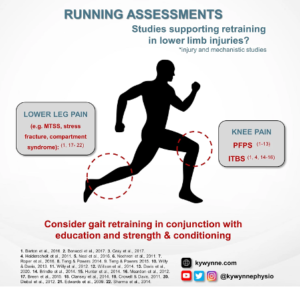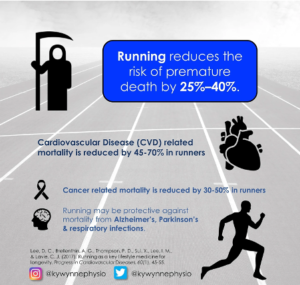Visit
Physiosports Brighton,
429 Nepean Highway, Brighton East,
3187, VIC, Australia
Call
Fax
03 9596 9155
physiosports@physiosports.com.au

Are you looking to start running? Or possibly wanting to increase your current amount of running and train for an event? Maybe you used to run and want to get back into it? Whatever your goals, this evidence-based blog looks to give you a few key pieces of information that you should consider.
When looking to start exercise, including running, goal setting has been recommended as a critical step (1). Take a look at a few of the evidence-based ways you can make your goal setting more effective (1, 2, 3):
In simple, load refers to the amount of demand placed on a system. For example, this could be the amount of kilometres run, the number squat repetitions completed, the amount of time swimming, the amount of weight lifted.. and so on. Each of these activities places stress on tissues and systems of the body.
It is well established in the scientific literature that ‘spikes’, or rapid increases in training load will put you at risk of injury (4). Whilst often best managed in conjunction with a coach/physio, keeping your training consistent, and increasing with an individualised ‘plan’ can help to reduce injury risk. If you want to learn a little more about training load, take a look here at an article written by running physio Ky Wynne.
It is important to monitor changes to speed, distance, incline/hills, rest periods, sessions per week, and more.
There are numerous methods of running plans, however a commonly accepted practice is polarised training (5). In simple, this refers to running with a large percentage of your weekly training kilometres at ‘lower training zones’.. e.g. lower intensity. Generally, we recommend runners to complete around 70-80% of their training at this ‘easy run’ pace, and the remaining 20-30% at higher intensities (e.g. interval training, speed sessions). An ‘error’ we often see is where runners spend too much time at ‘moderate intensity’ and not enough at high or low intensity. Please note this isn’t specific to everyone, and having an individualized program is often best.
Having appropriate footwear to run is super important. There is no one particular shoe that is ‘best’ and it will often vary for each individual. However, we do know that in runners shoes typically need to be replaced every 400-800kms. This may vary depending on what type of shoes you wear, what kind of training, and if you rotate shoes. If you are unsure and want to know more, touch base with one of our Podiatrists.
Running is a high impact sport, with lots of force required to be absorbed and produced by the body. Most of this is completed by our musculotendinous system (muscles and tendons). One of the best ways to reduce your likelihood of injury, and improve your running performance, is to increase your strength and capacity of key running muscles. This could take a variety of forms, including a gym program, home-based workout, plyometric exercises, and more. We recommend an individualised program be put together by someone with running-specific knowledge.
Running is a repetitive movement composed of 1000s of gait cycles. Small changes in these gait cycles can have big impacts, both positively and negatively. Running technique can impact on your running economy, which is how much energy your body utilizes to run at a particular pace (6). Additionally, sub-optimal running technique can also increase injury risk and is linked with a number of the common running injuries we see in the clinic (7).

Running is an individual sport, however it is easy to compare yourself to others. When starting out, it is best to try and ‘run your own race’ in regards to your training sessions. If you aim to match other runners, you may find yourself doing ‘too much too quickly’, or not training at the right level for yourself.

This blog was written by Ky Wynne, a running physiotherapist and exercise scientist. If you want to book in an assessment of your running, have a running injury treated, or put together a personalized strength program to improve your running, book an appointment with Ky by calling 9596 9110.
References:
If you have had a recent running injury, or want to improve your running technique, you may benefit from a running assessment. Contact Physiosports Brighton on 9596 9110 to book in a running assessment with running physio Ky Wynne.